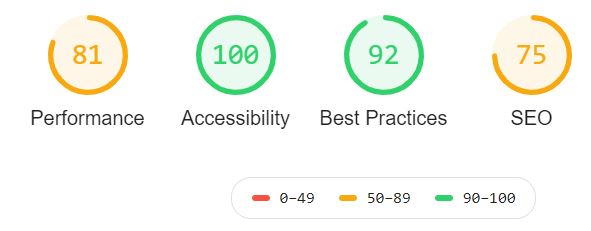The benefits of Google Lighthouse for SEO and site performance
Introduced in mid-2018, Lighthouse is a Google tool that analyses web pages and their performance. Lighthouse’s primary focus is web applications and mobile sites, but the information it provides and the recommendations it suggests are useful for making any website more efficient. With over half of mobile users bouncing away from a page that takes longer than 3 seconds to load, it’s easy to see how anything that will increase website speed and performance should be taken seriously.
Google Lighthouse for SEO is available as a chrome extension. You can also use ‘inspect’ when performing right click of your mouse on any open web page. Plus there are other individual websites that offer the test as well.

The Lighthouse tests (or audits) cover 5 areas of performance – accessibility, performance, best practice, SEO and progressive web apps – and scores a website when viewed on the lowest common denominator i.e. a weak 3G signal on an older, slower device. Simply put, it views a page with the same eyes as a user on an old phone with a poor connection. Although this may feel like setting a page up to fail (after all, the most optimized page would struggle in such a scenario), the idea is to improve speed. If Lighthouse can improve the performance of a page under such poor conditions, imagine what it can do on the latest device on the fastest network!
The audits yield scores out of 100. A good result is 90-100, an average score is 50-89 and a poor score is 49 and below. Any score of 90 or above will, according to Google, place you in the top 5% of top-performing sites.
How can Google Lighthouse be applied to SEO?
The Google Lighthouse for SEO check will run a simple SEO audit to uncover basic SEO issues. Once complete, Lighthouse will offer suggestions to solve the issues.
Current SEO checks are an ongoing, evolving, works in progress and currently look for:
- a <title> element
- a <meta name=”viewport”> tag with width or initial-scale
- a meta description
- a successful HTTPS status code
- page load times
- image sizes
- links with descriptive text
- legible font sizes
- indexing issues e.g. blocks
- unwanted plug ins
Additionally, there are also extra, manual checks that can be carried out, again with suggestions for solutions.
Google Lighthouse for SEO isn’t the one-stop tool to use above all else, but it is a very valuable addition to your toolkit. Unlike other tools which give a static high-level overview of your site, Lighthouse is more fine-tuned and offers instant feedback, based on real-world usage. Although the SEO checks are basic for now, they are welcome nonetheless.
Lighthouse can be run on any web page, allowing you to check your performance in relation to the performance of your competitors’ pages. Regardless of whether you are selling a product, there is always competition between sites in similar fields – Google search results are the best illustration of this; if you want to rank higher in Google search results, and therefore be seen sooner, you will be competing with hundreds or thousands of similar sites. Lighthouse is just one tool that may help you have the edge.